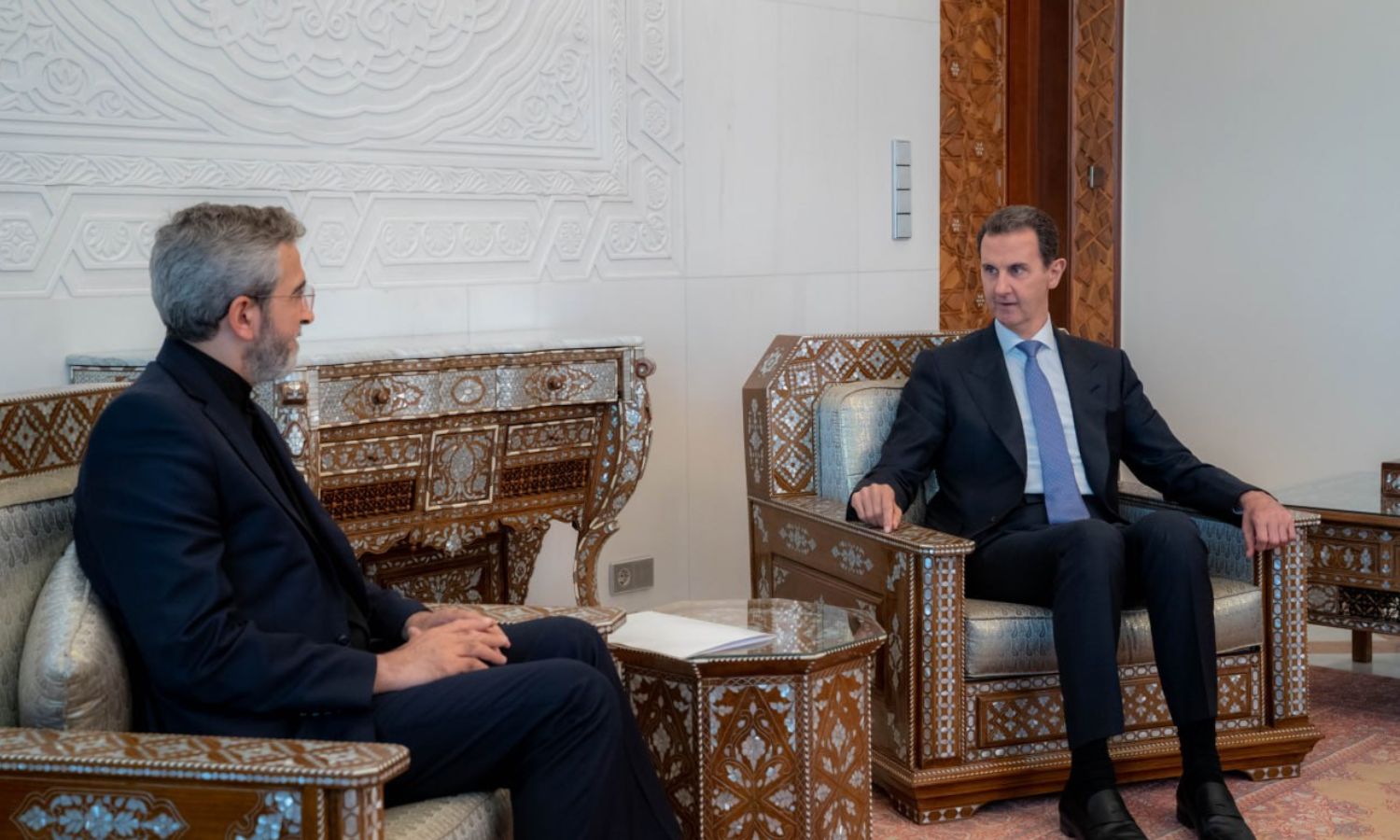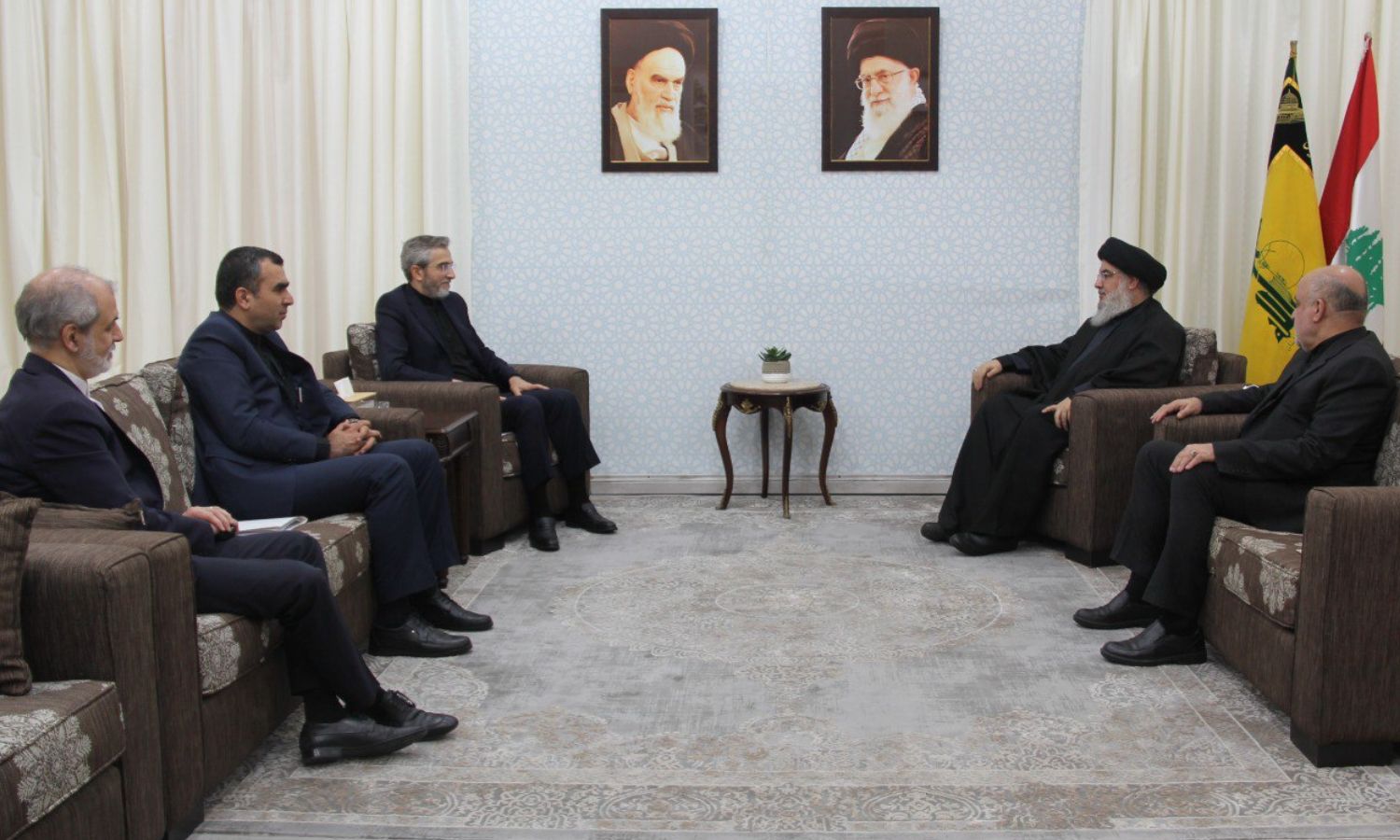



Enab Baladi – Hussam al-Mahmoud
The visit of the Acting Iranian Foreign Minister, Ali Bagheri Kani, to Syria carried dimensions that differ from previous visits in light of the accompanying diplomatic activity.
The visit comes at a time when Tehran has not yet healed its wound, following the death of its president, foreign minister, and six other officials in a plane crash on May 20.
On June 4, Bagheri visited the Syrian capital, Damascus, and met with the Syrian regime’s president, Bashar al-Assad. The Syrian Presidency platforms on social media reported that al-Assad discussed with Bagheri the bilateral relations between Syria and Iran, developments in the occupied Palestinian territories, and other regional and international issues of mutual interest.
The Iranian minister emphasized that the relationship between Iran and Syria would remain deep and strategic, based on solid principles and common, sincere interests. He pointed out Iran’s constant efforts to develop and invest in these relations for the benefit of both countries, as well as the region and its people.
Bagheri’s visit to Damascus came after a short visit to the Lebanese capital, Beirut, where he met with Prime Minister Najib Mikati, his Lebanese counterpart Abdallah Bou Habib, Lebanese Parliament Speaker Nabih Berri, and Hezbollah Secretary-General Hassan Nasrallah, according to the Iranian agency ISNA.
This visit marks the first foreign trip for the acting Iranian foreign minister, coming two weeks after Iran lost a group of top leadership figures, leading to the appointment of deputies for both the president and foreign minister until the scheduled presidential elections on June 28.
Four days previously, al-Assad visited Tehran and met with the Supreme Leader of the Islamic Revolution, Ali Khamenei, to offer condolences for the death of Iranian President Ebrahim Raisi and his companions.
Al-Assad’s visit came ten days after Raisi’s death, as he did not attend the farewell ceremony in Tehran, which was attended by delegations from various countries with different political and diplomatic representations. Representing the regime were Prime Minister Hussein Arnous, National Security Advisor Ali Mamlouk, and Minister of Economy Mohammad Samer al-Khalil.
Demonstrating the nature of the relationship with Iran, the Syrian regime announced three days of mourning after the death of Raisi and his entourage, and lowering the flags. This was a step only taken once since al-Assad came to power in 2000, after the attack on the military academy in Homs in October 2023, and was not observed during the February 6, 2023 earthquake that killed thousands of Syrians and affected four Syrian provinces.

Iranian Foreign Minister meets the Secretary-General of Hezbollah in Lebanon – June 4, 2024 (Al-Manar channel)
The profound and strategic relationship between the Syrian regime and Iran, and the firm principles it is based on, which Bagheri emphasized during his meeting with al-Assad, are not new in the statements of both sides. However, they come amid unofficial discussions of Arab political pressures on al-Assad due to his lack of response to what the Arabs presented as a “chance,” clearly manifested through the “Jordanian Initiative,” which aimed to address Arab concerns of reducing Iranian presence in Syria.
Indicators of Arab discontent with the regime were apparent during al-Assad’s lackluster participation in the Bahrain Summit on May 19, where he left without any statements, speeches, or substantial side meetings. Unlike the previous summit in Jeddah, Bahrain’s summit simply reiterated the importance of ending the Syrian crisis in alignment with UN Security Council Resolution 2254.
While it was the second regular Arab summit al-Assad attended after a 12-year absence, it was also the first where the final statement emphasized moving towards a transitional phase in Syria, differing from the Jeddah Declaration, which welcomed Syria’s return and emphasized its Arab identity and recovery.
Additionally, the Gulf Cooperation Council’s final statement, with the exception of the UAE, on June 9, urged the Syrian regime to implement the resolutions from the meetings in Amman and Cairo last year. It also emphasized supporting the efforts of the United Nations for a political solution in Syria, in line with UN Security Council Resolution 2254 and other relevant UN resolutions.
Despite the mention of relations with Iran in the “Jordanian Initiative” as an issue needing resolution from the regime, the official Arab behavior (despite talks of strained relations with al-Assad) proceeds differently. On May 26, Saudi Arabia appointed its first ambassador to Damascus since 2012. Jordan, too, slowly moves towards a political normalization with Iran, following political groundwork laid by Crown Prince Hussein bin Abdullah on May 26, revealing a Jordanian-Iranian dialogue, after the kingdom foiled an Iranian “plot” to support regime opponents.
In an interview with Al-Arabiya channel, the Crown Prince mentioned there was a Jordanian-Iranian dialogue on various issues, expressing his hope for it to yield positive results, while emphasizing the priority of preventing Jordan from becoming an arena for regional conflict.
In response to a question on his view of the recent rapprochement between Iran and some Arab countries, the Crown Prince explained that Arab countries and Jordan seek normal relations with Iran, based on good neighborliness and non-interference in each other’s affairs. He added that to achieve healthy relations, all causes of tension must be addressed.
Iranian affairs researcher Mustafa al-Nuaimi explained to Enab Baladi that Iran sends messages to the Arab region and Israel, stating that the painful blows it receives will not deter its project and that Tehran, with emergency officials and regional affiliates, can pressure Washington’s allies in the Arab region.
According to the researcher, the visit may reflect Tehran’s absorption of the shock of losing its president and foreign minister, quickly appointing replacements without significant internal or external repercussions. The president in Iran holds an executive, not sovereign, role, and actions in Tehran adhere to the Supreme Leader’s (Ali Khamenei) policies.
Regarding the recurrence of these visits and their simultaneous occurrence with challenges faced by the Syrian regime, researcher al-Nuaimi sees that the visits are based on perceived threats and risks per Iranian assessments. The void left by the assassination of Quds Force commander Qassem Soleimani has not been filled by his successor, Esmail Qaani, naturally leading to increased visits by the Foreign Minister (formerly Hussein Amir-Abdollahian) in this context.
Strategic expert and non-resident researcher at the Stimson Center in Washington, Amer al-Sabaileh, told Enab Baladi that the Syrian regime cannot abandon Iran in the foreseeable future, given the complex dynamics and the regime’s inability to risk drifting away from Iran at this stage. This is natural due to the series of events since 2011 until today.
According to the Jordanian researcher, Iran’s deep involvement in Syria is not solely about Syria. Utilizing Syrian geography has been consistent for the Iranians over the past years. Currently, the problem lies with Iranian influence in Syria, its manifestation, and its negative repercussions on everyone (drugs, weapons, and militias), which are a significant concern for the Arabs, challenging the regime.
Comparing al-Assad’s participation in the Jeddah summit and his recent participation in the Bahrain summit, al-Sabaileh notes that one year was not enough for the Syrian regime to improve its standing among the Arabs. He also doubts Iran’s ability to improve its relations with the Arabs due to a substantial security legacy, stating that Jordan also faces difficulties in pursuing relations of this nature. Things are complicated, and Jordanian geography has become crucial for Iran.
“We cannot rely on back-channel diplomacy or attempts to zero out disputes to transfer to distinguished relations with Iran,” al-Sabaileh said, indicating that Arab countries hope the regime will take steps it cannot deliver. Some Arabs believe in the merit of providing facilitations to Damascus, considering that closing the Arab door opened the Iranian gateway.
However, this equation is difficult to achieve in the foreseeable future due to complexities and the issue’s association with international decisions, meaning the Syrian regime cannot provide what significantly satisfies the Arabs.
After the death of Hussein Amir-Abdollahian, Ali Bagheri was elected with government approval to oversee the Ministry of Foreign Affairs.
Bagheri previously served as Deputy Foreign Minister for Political Affairs, appointed by government spokesman Ali Bahadori Jahromi and by order of the first deputy to the president, Mohammad Mokhber, to be chairman of the Foreign Relations Committee in the government.
Ali Bagheri (58 years old) is a former member of the Assembly of Experts, a member of the board of trustees of Imam Sadiq University, and holds a Ph.D. in education and economics from Imam Sadiq University.
At the age of 22, he became the international deputy at the Supreme National Security Council Secretariat. In 2004, he became the director of Central and Northern Europe at the Ministry of Foreign Affairs. He also worked within the Iranian nuclear team under Mahmoud Ahmadinejad’s administration, participating in the nuclear negotiations alongside Saeed Jalili at the Supreme National Security Council.
In 2018, he was appointed Deputy for International Affairs and Head of the Judiciary’s Human Rights Council by President Ebrahim Raisi before being appointed Deputy Foreign Minister, succeeding senior nuclear negotiator Abbas Araghchi.
Bagheri took the ministerial position while many regional files, previously under Abdollahian’s attention, remain unresolved. Turkish rapprochement with the Syrian regime via the quadripartite path has not yielded results. The war in Gaza continues with no signs of cessation, amid Israeli hints at opening a new front on the northern border with southern Lebanon.
if you think the article contain wrong information or you have additional details Send Correction